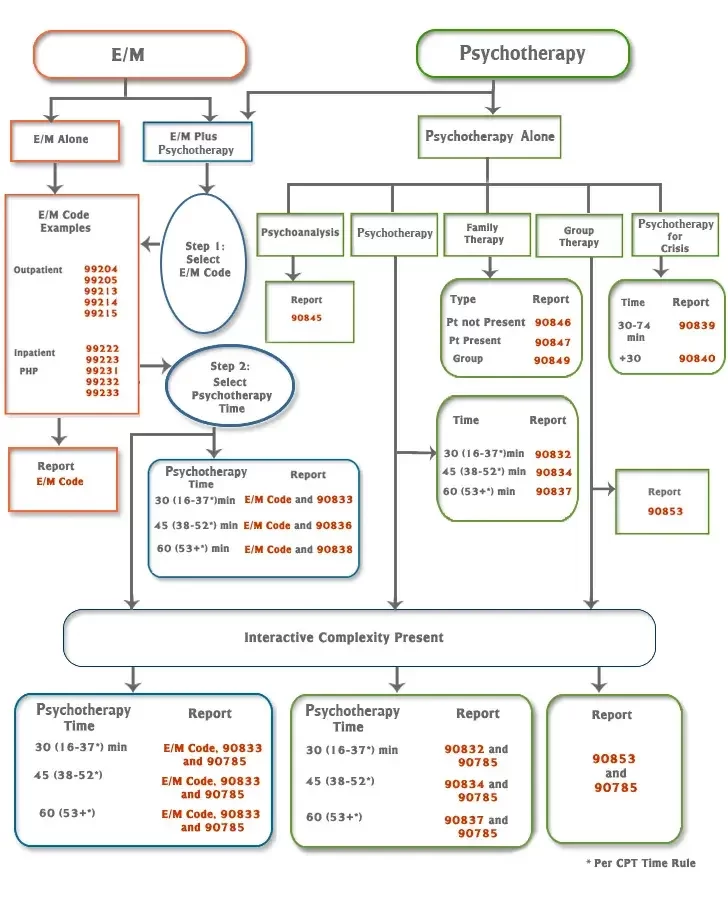The American Medical Association (AMA) has introduced major coding changes in the Psychiatry section of Current Procedural Terminology (CPT) for 2013. The changes are applicable for all services that are provided on or after January 1, 2013. As CPT codes are mandatory for billing and documentation, the changes are of great significance for physicians and insurance carriers. Here is the screenshot for E/M and Psychotherapy coding algorithm in 2013.
Major Changes in CPT Codes
Important: Now, the time for each psychotherapy code is described ad the time spent with the patient and/or family member. Earlier, it denoted only the time spent face-to-face with the patient.
- Separate codes have been introduced for initial evaluation with medical services done by a physician (90792) and an initial evaluation done by a non-physician (90791).
- The codes for psychotherapy have been simplified and expanded to include overall time spent with the patient and/or family member. Earlier, the coding was based on the distinct settings and/or whether E/M services were provided. Now, three timed codes (90832- 30 minutes, 90834-45 minutes and 90837- 60 minutes) are to be reported for psychotherapy in all settings. If psychotherapy is provided along with an E/M service, then psychiatrists are required to use timed add-on codes to specify that both services were provided. The codes to be used are 90833 -30 minutes, 90836 – 45 minutes and 90838 – 60 minutes) along with the plus symbol.
- An add-on code for interactive complexity has been introduced in the place of separate codes for interactive psychotherapy. The add-on code (90785) may be used (as defined in CPT manual), when there is a complex patient encounter which involves the need for people other than the patient (in most of the cases, the treatment of children). It can be used along with the initial evaluation codes (90791 and 90792), E/M codes (if used along with psychotherapy services), psychotherapy codes and non-family group psychotherapy code (90853). But, the documentation must indicate the interactive complexity clearly.
- As psychiatrists are expected to use a high level E/M code while providing services for patients in crisis, a new code has been introduced for psychotherapy at the request of the National Association of Social Workers for crisis encounter. That code is 90839, if the crisis encounter is within 60 minutes. If the encounter goes beyond that time, an add-on code (90840) needs to be added for each 30 minutes. There are guidelines in the CPT manual on what constitutes a crisis and when physicians have to use this code.
- CPT code for pharmacologic management (90862) has been eliminated. Psychiatrists are now required to use the appropriate E/M code while providing pharmacologic management services to a patient. If psychotherapy is provided along with pharmacologic management, then add-on codes should be used in addition to the E/M code. Psychologists in New Mexico and Louisiana (given permission to prescribe) use an add-on code +90863, if medication management and psychotherapy are done in the same session. But psychiatrists or other medical mental health providers cannot use this code.
Coding Evaluation and Management (E/M) Services by Key Components
Evaluation and management documentation is on the basis of three key components History, Physical Exam and Medical Decision Making. The four levels of History and Physical Exam based on incrementally increasing complexity and detail are:
- Problem focused
- Expanded problem focused
- Detailed
- Comprehensive
The four levels of Medical Decision Making according to increasing complexity are:
- Straightforward
- Low complexity
- Moderate complexity
- High complexity
Psychiatrists are now required to use the standard E/M evaluation codes to bill for their medical evaluations; when appropriate, they have to report the new psychiatric evaluation and psychotherapy codes.
CPT Codes for Evaluation and Management
New Patient Office
CPT Code
99201
99202
99203
99204
99205
History
PF
EPF
DET
COMP
COMP
Exam
PF
EPF
DET
COMP
COMP
MDM
Straightforward
Straightforward
Low
Moderate
High
Established Patient Office
CPT Code
99211
99212
99213
99214
99215
History
N/A
PF
EPF
DET
COMP
Exam
N/A
PF
EPF
DET
COMP
MDM
N/A
Straightforward
Low
Moderate
High
Initial Hospital/PHP
CPT Code
99221
99222
99223
History
DET
COMP
COMP
Exam
DET
COMP
COMP
MDM
Straightforward
Moderate
High
Subsequent Hospital/PHP
CPT Code
99231
99232
99233
History
PF
EPF
DET
Exam
PF
EPF
DET
MDM
Straightforward
Moderate
High
It is not an easy task to incorporate the new changes appropriately when coding is done in-house. The best alternative is to consult a professional medical billing and coding company that provides medical coding and medical billing services.

